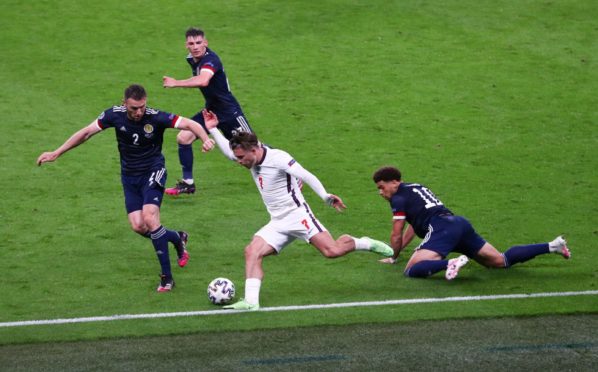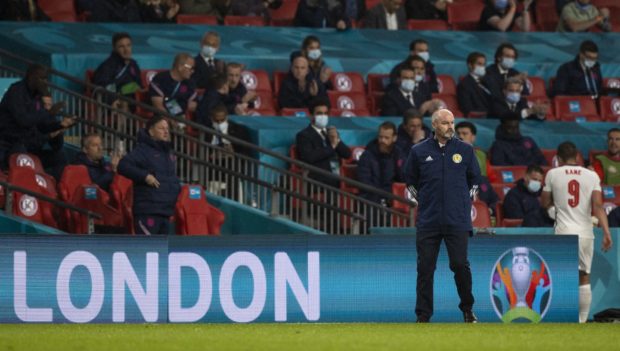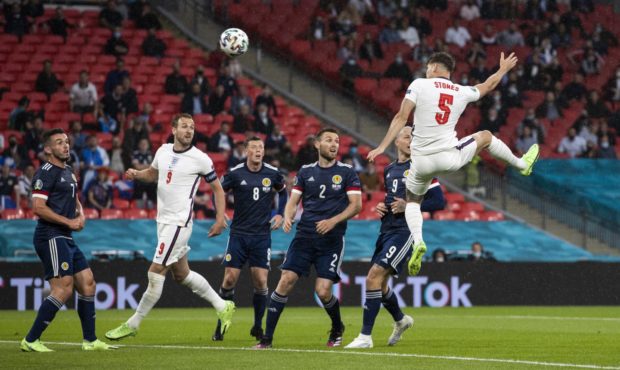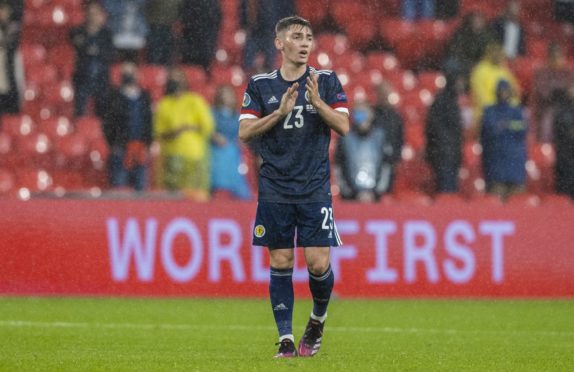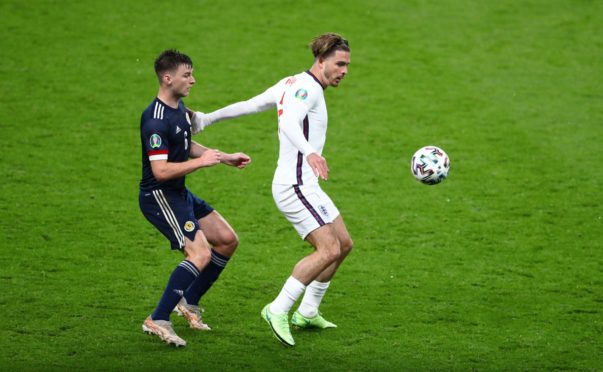“I had just forgotten a bit how this game destroys your emotions.”
The prophetic words of Ally McCoist, a Scotland veteran of battles with England, came on co-commentary duties for ITV with 81 minutes of this gripping affair on the clock.
A game laced with so much importance, given both teams’ respective Euro 2020 needs, dragged supporters of Scotland and England through the ringer and back.
Several in Scotland jerseys gave their best displays under the national team banner. Kieran Tierney, Ché Adams, Billy Gilmour et al stepped up to the plate when their country needed it.
For England it was a blunt display, partly of their own making but also owing to the doggedness with which Scotland players stuck to their tasks.
It keeps Scotland’s hopes of extending their stay in this tournament alive. It tees up a sensational evening against Croatia on Tuesday night in Glasgow.
Steve Clarke may have tried to downplay the boldness of his selection pre-match, however it was a clear change of intent from the Scotland boss.
Scott McTominay reverted to his position during the Nations League games, shifting to centre-back, with Gilmour handed his first start in the middle of the park. Ché Adams’ selection up front was not much of a surprise after his omission on Monday.
Those of a Tartan Army persuasion needed little extra to add to the anxiety. John Stones hitting the frame of the goal, hanging in the air for an inexorable amount of time before connecting with the ball, and Mason Mount nearly profiting from McTominay’s error did just that.
The words “arrogance” and “respect” were thrown about with abandon in the pre-match narrative; England denying they had a superiority complex, Scotland hoping to earn more appreciation from those south of the border.
Tenacity soon became the buzzword. John McGinn’s battle with Kalvin Phillips, Gilmour’s tussles with his Chelsea team-mate Mount, Lyndon Dykes going one-on-one with Tyrone Mings; if the meaning of this tie had supposedly been dimmed by the relentless nature of modern football, the players had not been told.
England were getting runners in behind, even if the passes and first touches did not align. Phil Foden and Raheem Sterling, part of Man City’s effervescent attacking unit, are not the kind of figures you ought to be letting out of your peripheral vision.
For Scotland and Clarke, at times it seemed like a band on a reunion tour. After a difficult hiatus, being stuffy, disciplined and carving openings down the left was like regaling an expectant crowd with your greatest hits. The first half would have been music to Clarke’s ears.
While England were shuttling the play laterally, hoping a crevice would appear, Scotland were happy. Shuffle right, set feet, block a channel. Reset and repeat.
Gilmour grew in stature with every minute, chastened not by the occasion of the game. Adams’ presence had clearly unnerved the England backline and had he sorted his feet out quicker, he may have capitalised on Dykes’ shot breaking to him.
Even Stephen O’Donnell, cast so easily as a scapegoat after the Czech loss, had shaken off the shackles of disappointment and reiterated why Clarke trusts him.
The introduction of Jack Grealish after the hour mark was cast as the game-saver for England. The home side were lacking in purpose, missing a character willing to plough head-long towards the navy-blue barricades with some invention.
He started with an intent, carrying the ball at McTominay, who stood firm. Harry Kane remained a peripheral figure, much to Scotland’s joy.
The England captain’s withdrawal for Marcus Rashford was a sign of job done.
The final whistle, when it came 12 minutes before 10pm, was indication the evening had gone to plan for Scotland, in one of the most celebrated 0-0s in many a year.
